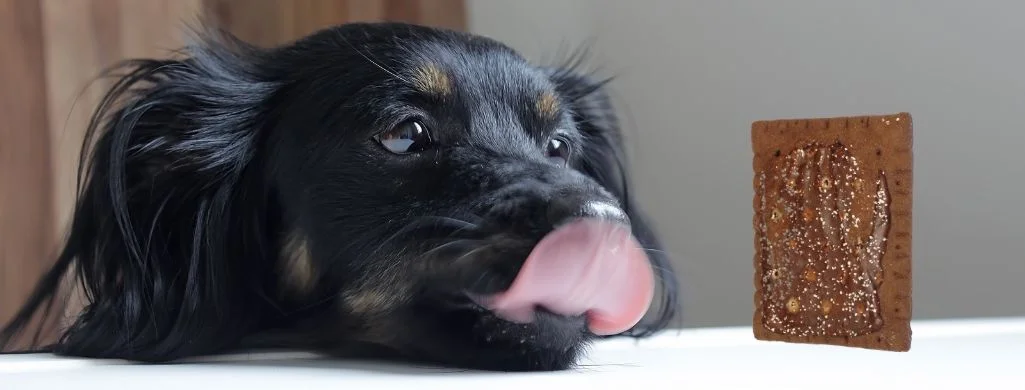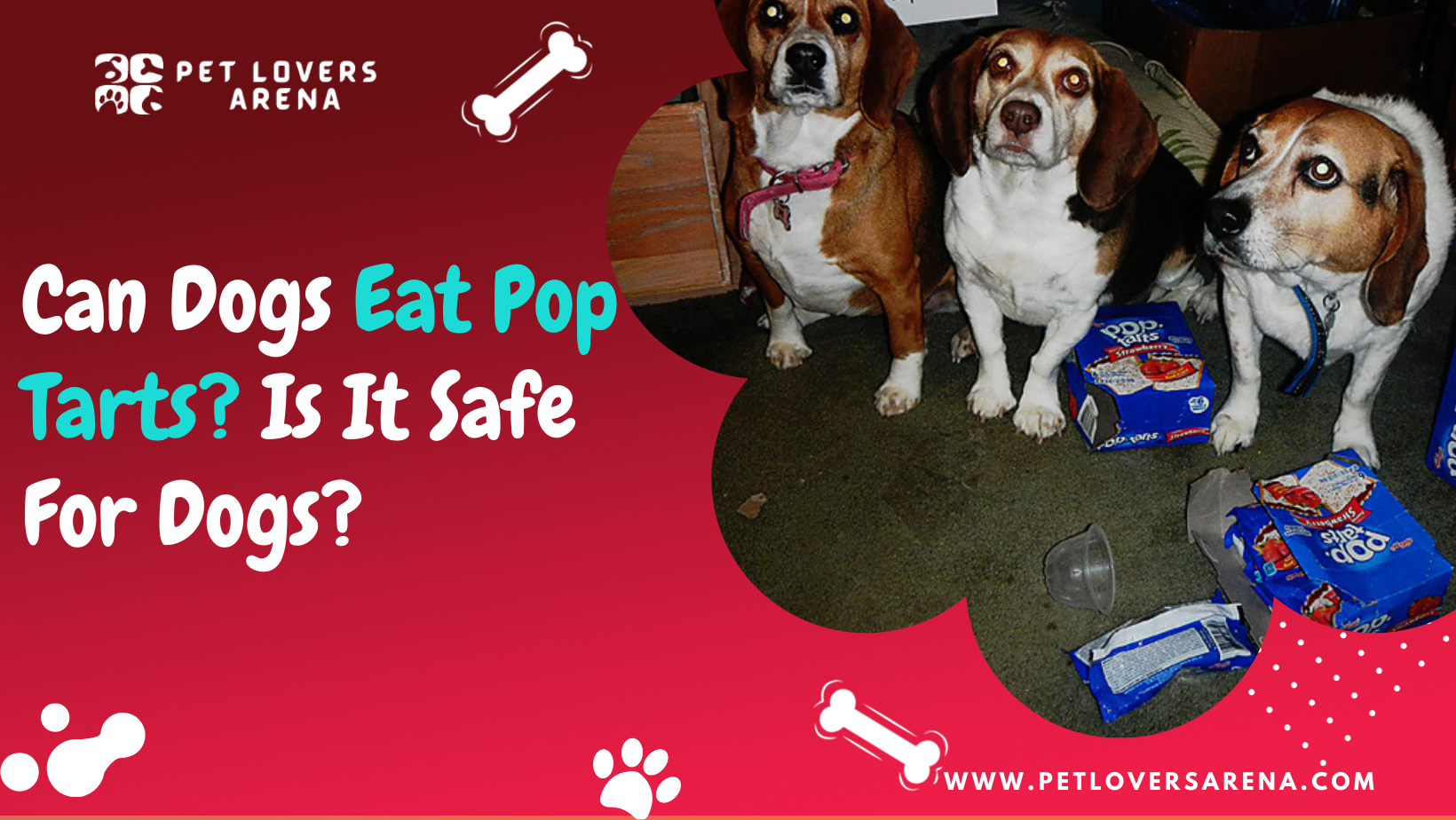It would be improbable to find someone who has not heard of the colorful treats that are pop tarts. Pop tarts are one of the toaster pastries, usually consumed during breakfast. But honestly, people consume it whenever they like, wherever they want, without giving it much thought. And it is perfectly all right.
Pop Tarts are consumables that can be consumed anytime. They are extremely popular and quite delicious as well. But the thing that one needs to keep in mind here is that they are designed for human consumption and not for canines specifically. This leads to the question of dogs having pop tarts.
Can dogs eat pop tarts? Is it safe for dog consumption? And if not, what should one do if their dogs have consumed a fair share already?
The answer to this is quite complicated. But the most straightforward way one could answer is with two words – it depends. The reason for such a convoluted answer is because of the different types of pop tarts that are available in the market.
While one type of pop-tart might be suited for your dog’s consumption, albeit in moderation, the other could be toxic and prove life-threatening – something no dog owner would want for their furry little friend. Some of the pop tarts might contain ingredients that contain xylitol, an artificial sweetener, which is highly toxic to dogs.
But even if one steers clear of such pop tarts, there is still the question of them containing sugar, salt, fats, and carbohydrates. And in large quantities as well. It can only bring bad news to your companion. So, again we are back to square one. Can dogs eat pop tarts or not?
Can Dogs Eat Pop Tarts?

It is best if you avoid giving pop tarts to your dogs; it is simply the wisest course of action you can go for. And while it does not do any good to dogs, if your dog takes a couple of bites now and then, there is not much you need to be worried about. But even then, the pop tarts you can give to your friend depend on some crucial factors.
- The type of pop tart selected for consumption
- The ingredients present in the pop tarts and their quantity
- The amount of pop tarts that you can safely give out
You need to keep in mind the last point specifically. Moderation is the key here, as you would not want your dog to fall sick because you showered them with too much love. The types of pop tart and the ingredients are also extremely crucial – something we will cover more in this blog.
Are Pop Tarts Safe For Dogs?

While they are not that dangerous for your dog’s consumption, it does not mean they are safe. Like many other human foods, pop tarts come into a category of food that dogs should avoid. Regardless of how much your dog loves the sweet taste of pop tarts, they are not safe for them. In addition, they do not contain any nutritional value at all, which is also a significant downvote when it comes to using pop tarts as a treat for dogs.
Here are some ingredients commonly found in pop tarts and their adverse effects.
1. Flour
Flour is a common ingredient found in pop tarts. It is the primary ingredient without which a pop tart cannot be made. Usually, pop tarts are made with enriched or standard wheat flour. The problem with it is that any dog with a gluten-sensitive stomach would find it difficult. What is worse is that this could also trigger an allergic reaction in the dog. No one wants that to happen.
If your dog has consumed pop tarts even after being gluten sensitive, here are some symptoms you need to look for allergic reactions.
- Red and itchy skin or possibly skin rashes all over the body
- Upset stomach
- Diarrhea
- Flatulence
- Vomiting
- Bloating
- Flatulence
While those mentioned above are dangerous on their own, they would easily turn into something worse if not treated quickly enough. Frequent sneezing, difficulty in breathing, asthma, and even seizure in some cases is often the next stage of the progression of these symptoms.
But what if the dog is not allergic to gluten? While in such cases, the impact of the flour on your dogs would not be that adverse, as mentioned earlier, it could still lead to weight gain and obesity. It has also been observed that dogs with a more than appropriate dog pop tarts diet are later diagnosed with diabetes and even arthritis. So, again at the risk of repeating ourselves, you need to moderate the pop tarts treat you give to your dogs.
If you are unsure about your dog’s sensitivity to gluten, then it would be wise for you to get that checked out immediately. Your vet would be able to conduct tests to determine whether such is the case. It would also be smart to get other standard allergic tests done simultaneously.
2. Sugar
Sugar is not healthy for dogs. It is one of the first pieces of dietary advice your vet or even the pet shop attendant would give. Sugar is something you will find amiss in pet food. Why? Because they are not a part of any dog’s healthy diet. Yes, a small amount of sugar would not affect your buddy’s health too much, but the sugar concentration in pop tarts is relatively high and in various forms.
The most common types of sugar present in pop tarts are commercial sugar, high fructose corn syrup, and even artificial sweeteners. Xylitol is an artificial sweetener, which is also extremely dangerous for your dog. It is fatal due to it being highly toxic. So, it is obvious why it is recommended that one should not give their furry friend too much of this treat. So, it is wise to check for the ingredients of the pop tart before giving even one to your pet.
Health problems caused in dogs by having too much sugar:
- Rapid weight gain, resulting in obesity
- Diabetes and resistance to insulin
- Common dental issues like tooth decay
- Pancreatitis
- Oils
Palm oil and soybean oil are other ingredients usually present in pop tarts. And in simplest terms, they both are harmful to the health of the four-legged canine. Palm oil and soybean oil lead to the dog gaining weight rapidly, resulting in obesity and other health-related problems.
In addition to this, TBHQ (tertiary butylhydroquinone) is an oil-based additive that is also present in the pop tarts to extend the shelf life of this product. TBHQ could result in vision impairment and neurotoxic effects in animals, not just dogs. So, this is another reason why you should avoid pop tarts for your dogs.
3. Chocolate

Chocolate is also an ingredient that is present in some types of pop tarts, not all, but some certainly do. Chocolate is also another ingredient that is toxic to dogs. Yes, it might come as a shock to many readers, but that is true. It is because of the presence of Theobromine, which is a substance that can be poisonous to dogs in many cases. Chocolate poisoning is a condition that is often observed in canines, with symptoms like vomiting, diarrhea, and even seizures.
But some chocolates are more harmful than others. Dark chocolates have the highest concentration of poisonous content and should be kept away from the dogs at all costs. Cocoa powder is another substance that contains a high level of Theobromine.
4. Additional flavors and coloring
To make the pop tarts more exciting and delicious, manufacturers often add artificial flavoring and colors to the product. Preservatives are also often added for the apparent purpose. Many dogs are often allergic to these products, which could lead to serious health problems in the future.
The problem is the coloring, flavors, and preservatives because their composition is often missing from the list of ingredients. So, you can never be sure whether your dog is allergic to them or not.
As you can see, pop tarts have no nutritional value and come with many health risks attached. It is strongly recommended that you should not use pop tarts as dog treats.
Also Read: Why Does My Puppy Have Loose Stools At Night?
Different Flavors of Pop Tarts

The last of three factors that determine whether it is safe for your dog to consume pop tarts is the type of pop tarts. Unluckily there are just too many types of pop tarts flavors to cover. Here are the most common and popular flavors of pop tarts that are consumed every day around the world. If any of the pop tarts you consume are not on the list, consider them too dangerous for your dog.
1. Chocolate Pop Tarts
We have got to the start of the most popular one. And regardless of what your opinion is concerning which is the best pop tarts in the market, it is the chocolate one that takes the cake away as the most famous pop tarts variant.
So, naturally, the very first question that needs to be answered concerning our topic is whether dogs can have chocolate pop tarts? And the answer is NO!
As mentioned earlier in the ingredient segment, chocolate can have an adverse impact on a dog’s health. In many cases life-threatening if consumed in large enough amounts. Pop tarts are already harmful enough, and by adding the chocolate, we are only making the matter worse.
It is, in fact, the most dangerous type of pop tart that a dog could consume. Chocolate is toxic on its own, but by adding sugar and flour, the contortion becomes even more fatal to the dogs; even a small amount can do significant damage. There is also the possibility of the presence of xylitol or alcohol ingredients, which could be poisonous as well.
If your pet has ingested a small bite of a chocolate pop tart, then they should be fine. Otherwise, they are at risk of chocolate toxicity. In such a case, you need to connect with your vet immediately.
Symptoms of Chocolate Toxicity:
Chocolate toxicity is a severe condition and even fatal if not properly cared for, so do not take this lightly. This condition occurs when your pet has ingested too much chocolate, or a product contains high chocolate content. The common symptoms of chocolate toxicity include:
- Severe and continuous vomiting
- Diarrhea
- The dog is drinking too much water
- Excessive Urination
- Higher than the average heart rate even when the dog is not being much active
- A state of restlessness
- Seizures
- Coma
- Tremors
As one can observe, many of these symptoms are quite serious. But the good news is that if you are quick enough to connect with your vet, the chances of complete recovery are actually quite good. So, if your dog is showing one or more of these symptoms, visit your vet clinic immediately.
2. A&W Root Beer pop tarts
A&W Root beer pop tarts should also be avoided at all costs. But before into the mechanics of why first, let’s clear out one question that every Root Beer enthusiast has on their mind. No, A&W Root beer pop tarts do not contain actual beer. It may seem like they do when one tastes them, but it is all the chemicals that are added to the mix. Salt, sugar, oils, etc., are some of the ingredients used to produce these pop tarts.
The A&W Root Beer pop tarts also contain caramel coloring and other artificial colors that your pet might be allergic to. When consumed, this could cause serious allergic reactions in your dogs. So, you should avoid this one as well.
3. Strawberry pop tarts

While raw strawberries are something you should encourage your dog to eat, the same could not be said about the strawberry pop tarts. And if you are now sensing a theme with the pop tarts, then you are not wrong.
Strawberry pop tarts are actually very mild compared to several other pop tarts on this list. But only if they are consumed in small amounts. Excess of any pop tarts, regardless of their flavor, would only be harmful to your dogs. Something to note here is that strawberry pop tarts contain a high content of sugar and sweeteners.
So, if you have a diabetic or an overweight dog, these pop tarts are not recommended as a treat. Even dogs with high blood pressure should steer clear of the strawberry pop tarts.
Another side effect that the dog could experience with the strawberry pop tarts is the triggering of other allergies.
4. Brown Sugar Cinnamon pop tarts
These pop tarts are also not recommended, even when they do not contain any brown sugar content. Yeah, foolish to name them as such, but that does not mean that they are not harmful to the canines. These pop tarts are filled with regular sugar (in place of brown sugar), corn syrup, dextrose, etc., which are not helping the dog’s health.
Another thing is the gluten content in the pop tarts is also relatively high – something you need to consider while giving your pet pop tarts.
5. Blueberry pop tarts

Just like the strawberry, blueberry alone is excellent for your canine. In fact, if you can encourage your dog to eat them, it would be great for their health. But blueberry pop tarts? No, shy away from them as much as possible. The case against the blueberry pop tarts is similar to strawberry pop tarts – they contain high sugar content. They also include artificial coloring, which is also not a point in its favor.
Alternatives For Pop Tarts

A pop tart is not the only treat you can give your dog to show your affection. Even if your buddy has been hooked on the pop tarts, which is understandable as they are delicious, it would be best if you prevent any further consumption and opt for a healthier treat.
Some of them are apples, blueberries, peanut butter, and carrots. In addition to this, there are many dogs treat products that are available in the market that will make your buddy forget about the delicious pop tarts immediately.
Look for those, and if unsure, connect with your vet and ask for advice.
Conclusion
You pretty much have got a clearer picture when it comes to your dog consuming pop tarts. Pop tarts are not something that is designed for pet consumption, especially dogs. Our four-legged companions are adorable and can be a lot of fun, but they can be stupid at times as well. If you have a pop tart stored in your house, you can fully bet on your pet to sniff it out regardless of where it is hidden.
But no matter how much they beg for it, you need to stay strong – something that can become quite difficult at times, especially when they make those gooey eyes. Here is a trick that you can use – only give pop tarts on rare occasions when your dog has done something good. This would prevent you from giving out too many pop tarts at one time. But additionally, it would help in the positive reinforcement as well.
If you have a pup, then you should not give them pop tarts at all costs. Not only does it not contain any nutritional content, but pop tarts can be incredibly harmful to pups, whose body systems might not be strong enough to handle the harmful effects of eating pop tarts.
It is best to avoid treating your buddy with pop tarts, and in case they have gobbled more than what they should, then take them to the vet immediately.
Meet Madison Phillips, your compassionate guide to pet well-being. With experience from VCA Animal Hospitals and Laxton Vet Clinics Bellaire Inc. Madison honed her skills and embraced the balance of medical expertise and compassion, through her articles, she simplifies pet care, whether you’re a newbie or an experienced pet parent.

